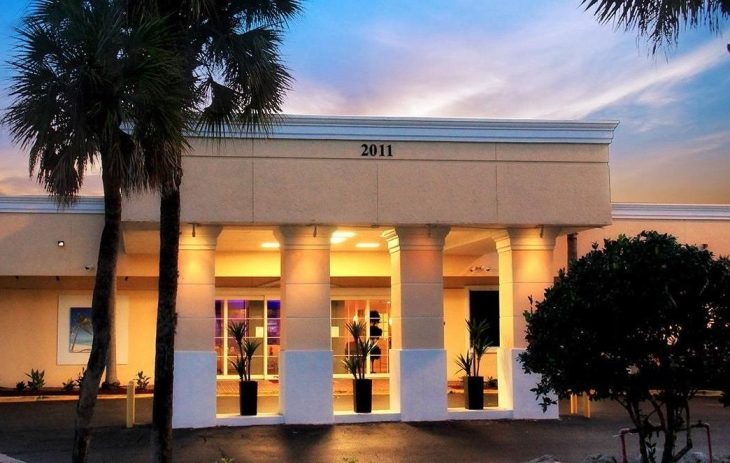About WhiteSands Treatment Plant City
WhiteSands Alcohol and Drug Rehab is a substance use and co-occurring disorder treatment center accredited by The Joint Commission. The facility is in Plant City, Florida on a 10-acre campus. They offer a full residential alcohol and drug detox program. They accept most insurance but they only work with out-of-network plans.
Most people stay in the detox program for about seven days though some people stay as long as 10 days. The admissions process includes a full history and physical within the first 24 hours of your stay. You’ll meet with a nurse and complete a urinalysis. You’ll then enter a private bedroom where most of your care will take place to ensure your privacy. You will have your belongings inventoried and searched on admission but you’ll receive them back in a few hours.
Within the first 48 hours, you’ll have a full psychiatric evaluation. It’s important to identify any underlying co-occurring disorders like depression or anxiety so that you understand the factors driving your substance use.
While in detox, you’ll have nursing care around the clock seven days per week. You’ll see an addiction medicine physician (addictionologist) daily to make sure you’re not having any negative medication responses.
They also offer medication-assisted treatment (MAT). If you’re having trouble with opiate addiction then MAT can help safely wean you from the opiates. While on MAT, you’ll see a provider weekly. Most people in the MAT program attend an intensive outpatient program (IOP), outpatient program, or therapy.
Once you’re through the detox program, you and your treatment team will decide on your next steps. The facility has inpatient and outpatient programs for your convenience.
Levels of Care
-
Inpatient
Inpatient and residential programs provide round-the-clock medical and emotional support as you live at the treatment facility. This level of care may be recommended if you have severe addictions or mental health conditions since it removes outside distractions and allows you to focus solely on therapy.
-
PHP
Partial hospitalization programs provide comprehensive treatment in a structured setting during the day but allow you to return home at night. These programs offer a balance of inpatient and outpatient rehab and provide intensive support without full time residency.
-
Outpatient
In outpatient therapy, you’ll attend therapy sessions several times each week while living at home. This is ideal if you have a strong support system and a lower risk of relapse. Outpatient treatment offers flexibility to maintain work, school or family obligations.
-
Dual Diagnosis
Dual diagnosis programs address substance use disorders and co-occurring mental health conditions simultaneously. This integrated approach to care improves the likelihood of long term recovery and stability by addressing the root causes of addiction.
Detox Service Setting
-
Inpatient Detox
Inpatient detox occurs in a dedicated treatment facility. You’ll live there around the clock and receive intensive medical support and supervision to help manage your withdrawal symptoms. It is suitable for individuals with moderate to severe addictions as it ensures a stable detox environment.
-
Outpatient Detox
Outpatient detox gives you access to medically supervised withdrawal services while still allowing you to live at home. You’ll attend a clinic for treatment and monitoring. This flexible option is suitable for those with mild to moderate withdrawal symptoms who have strong support systems.
-
MAT
Medication assisted treatment combines medication and counseling to manage withdrawal and reduce cravings for opioid and alcohol addiction. Medications may include methadone, buprenorphine or naltrexone. MAT is tailored to your needs so you can actively participate in your treatment journey.
Programs
-
Adult (18+)
Adult programs address the substance use and life challenges specific to adults. Therapists can deliver sessions in individual, group and family settings. Services often include job support and life skills training in a structured environment.
-
Alcohol Detox
Alcohol detox programs offer medical support to help individuals withdraw safely from alcohol. Your care team may use medications to ease your symptoms and provide medical monitoring to address complications.
-
Men
Men's programs address substance use while also considering the social pressures, family roles and mental health concerns that are specific to men. You’ll learn healthy coping mechanisms as you build emotional resilience and develop communication skills.
-
Opioid Detox
Opioid detox uses medications to ease severe withdrawal symptoms. It also includes medical supervision to help you manage potential complications. These services allow you to stabilize and begin a recovery plan.
-
Women
Women's programs offer a safe and supportive space to focus on gender specific issues such as trauma, family roles and mental health conditions. Therapists tailor the sessions to address women's needs and foster empowerment in a healing and nurturing environment.
-
Young Adult (18 - 25)
Young adult programs are designed for individuals who are transitioning into adulthood. Topics of discussion typically include identity, independence and peer relationships. Providers may also offer life skills training and career support.
Accreditations
-
 LegitScript Certified
LegitScript Certified
-
 Joint Commission
Joint Commission
Amenities
- Fitness Center
- Private Rooms
- Spa
Contact
2011 North Wheeler Street
Plant City, FL 33563





